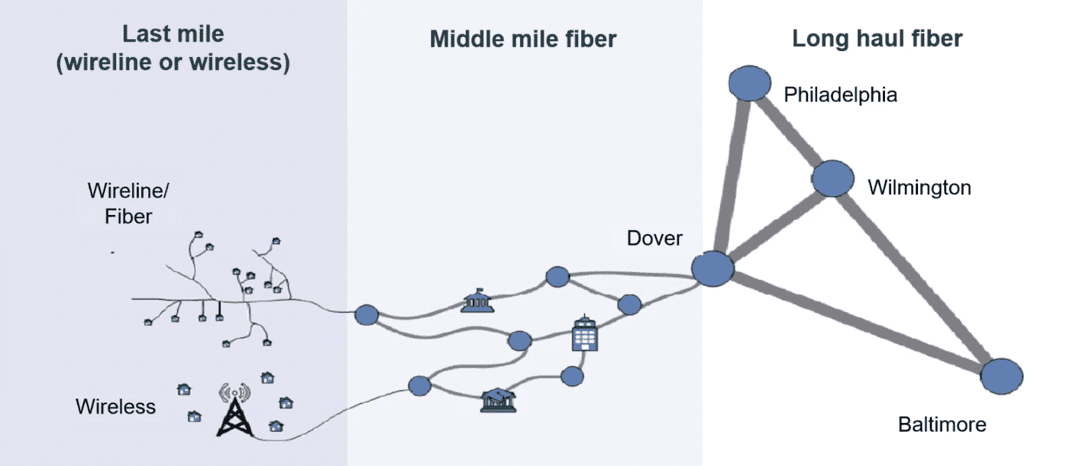Kent County farm owner Jane Warren is anxious to have internet service at her home, but there’s no way to do that now.
“We cannot function because everything is done online,” she said during a Delaware Department of Technology and Information public hearing Wednesday night about state efforts to expand broadband access.
The department has until August to develop a five-year plan to increase internet access in unserved and underserved areas of the state and Wednesday night’s hearing was the first of three, one in each county, to hear what people want.
Warren said the only way she now can use the internet now is to drive to a nearby hotspot.
“And when I was still working … it was expensive and half a mile away in the middle of nowhere,” she said.
RELATED: State fends off 567 billion cyberattacks; adding broadband
Jason Clarke, Delaware’s chief information officer, told the Joint Finance Committee last month that the department expects a budget of $158 million to fund the installation of broadband technology in the state’s internet deserts.
Work to expand the network already has begun in all three counties, thanks to state American Rescue Plan Act money, he said.
While many in rural and underserved areas have complained for decades about the lack of internet access, schools going to a virtual mode during the pandemic threw the issue into a harsh spotlight.
Many children didn’t have access to broadband service or the devices they needed to attend classes and that one issue helped focus efforts to get them help.
The expansion’s target will be unserved and underserved locations, low income and affordable housing communities, and community anchor institutions like libraries, hospitals and community centers, said Tammy Shelton, broadband manager for the department.
The speed of internet service will be one way the state determines who is and who is not receiving adequate access.
The Department considers those who cannot get internet speeds of at least 25/3 megabytes per second (mbps) – a measure of how much information can be moved in that time – to be unserved, and those that get speeds between 25/3 mbps and 100 mbps to be underserved.
They’ll focus on community anchor institutions that have internet speeds below 1 gigabyte per second (gbps).
Delaware’s state threshold for what it considered adequate broadband is 100/100 mbps. That is said to be adequate for a family of four who are streaming movies on their own devices, participating in video meetings, and playing multiyear online games.
Two Kent County residents said that they were spoiled in other states because they had multiple internet providers, and when they moved into rural Delaware, they realized they had limited options.
The Department will prioritize expanding internet access for:
- Rural residents
- Low-income individuals
- Veterans
- Individuals over the age of 60
- Individuals with disabilities
- English learners and individuals with low levels of literacy
- Racial and ethnic minorities
- Incarcerated individuals
“We want all of these folks to be a part of being on the internet and using it effectively so that they can live more comfortable lives and also contribute back to society,” said Marcia Jones, one of the project managers working on broadband access.
Officials from the Department repeatedly highlighted the importance of digital equity.
“What good is a network if you’re not able to get on the internet, if you’re not able to use the applications, if you don’t have a device, or if your device isn’t working?” said Jack Burbage, a consultant on the project.
He said it’s important for people to be able to hunt for jobs or sign on to a telehealth appointment.
Educating people about how to use the internet to connect to services and watch for scammers will be part of the expansion, but there weren’t any specifics about that discussed Wednesday.
Clarke told the JFC that it costs $100,000 per mile to install broadband cable. Most of the people who don’t have it live one and one-half miles from a broadband line, he said.
All three officials used a graphic Wednesday to show how it’s the last mile of broadband that is expensive and now restricts internet access.
The system starts with long haul fiber near large cities. That changes to middle mile fiber as service moves to areas with less-dense population and finally individual service to homes.
The department expects to receive at least $100 million from the Federal Communications Commission this summer and has applied for additional money on top of that. That money will come to Delaware starting in the first quarter of 2025.
Additional state grants will be released in February 2024, they said.
“It takes a long time to build a network and not just one house,” Shelton said. “Nobody wants to be the last house to get served, but we have a lot of homes still to serve.”
Sussex County’s public hearing is Thursday at 6:30 p.m. at the Georgetown Public Library. It will be livestreamed here.
New Castle County’s public hearing is Monday, March 6 at 6:30 p.m. at the Appoquinimink Community Library. It will be livestreamed here.


Raised in Doylestown, Pennsylvania, Jarek earned a B.A. in journalism and a B.A. in political science from Temple University in 2021. After running CNN’s Michael Smerconish’s YouTube channel, Jarek became a reporter for the Bucks County Herald before joining Delaware LIVE News.
Share this Post





